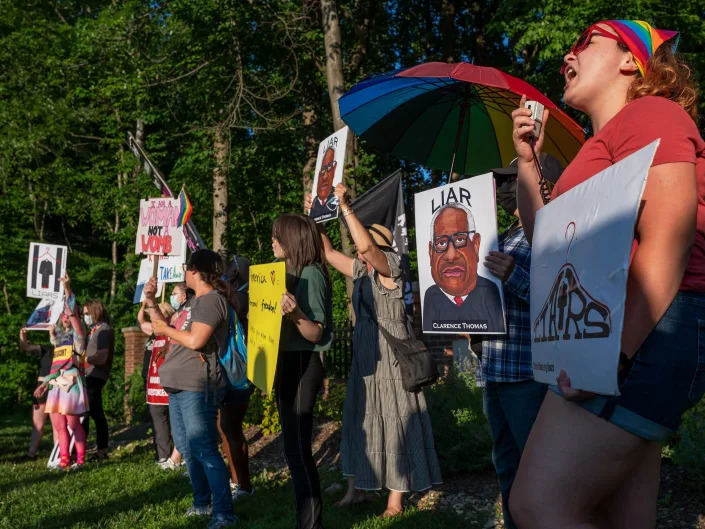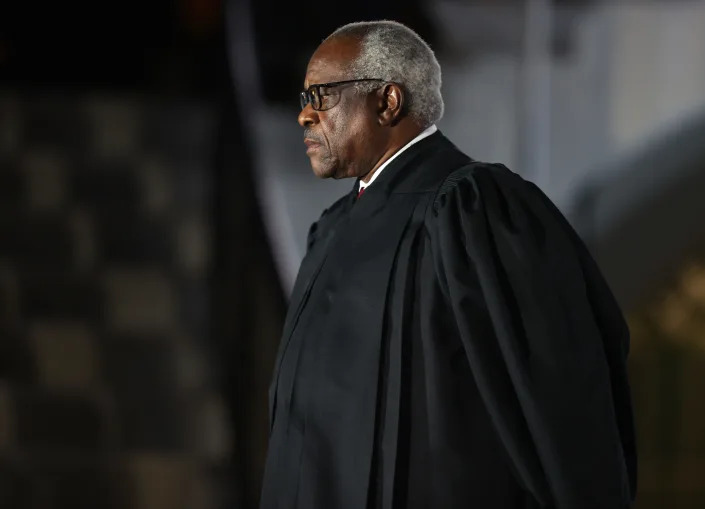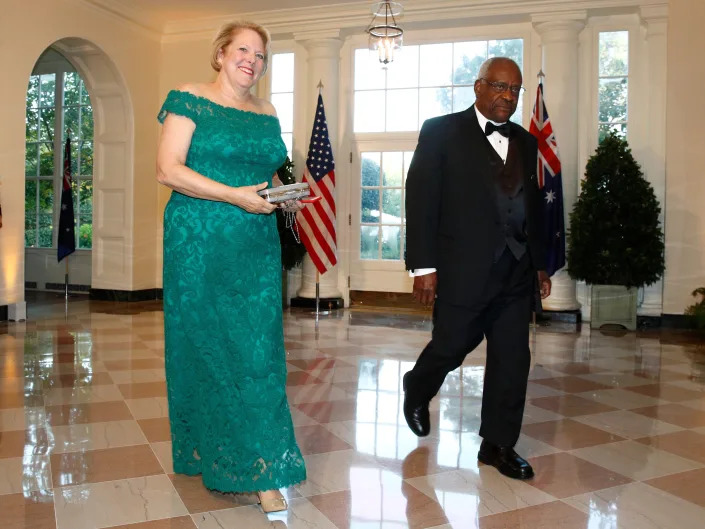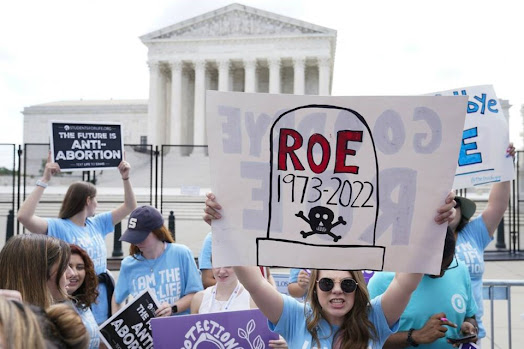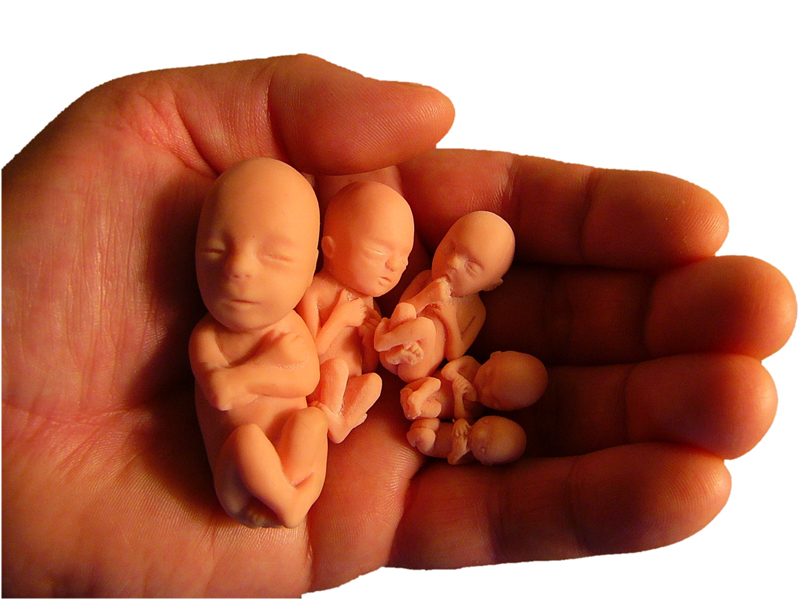ABOLISH SCOTUS
AOC questions legitimacy of Supreme Court and calls Biden ‘historically weak’ on abortion
Sheila Flynn
Sat, June 25, 2022
Democratic Rep. Alexandria Ocasio Cortez has questioned the legitimacy of the Supreme Court and challenged president Joe Biden to “step up” on abortion rights.
Ms Ocasio-Cortez on Saturday forensically laid out, in a Twitter thread, many of the problems she had with Supreme Court judges, calling for Democrats to outline a clearer and more instructional plan for voters on how to codify Roe v Wade – less than 24 hours after the nation’s highest court reversed its 1973 ruling, leaving it up to states to now legislate on abortion.
“Election or not, the Supreme Court has a legitimacy crisis and the public reaffirms it: 75% of the US public reports lacking confidence in SCOTUS, & those numbers were *pre-Roe ruling*” she tweeted Saturday.
She said in reply to another tweet that Mr Biden has been “historically weak on this issue (supported Hyde until ‘19), but now is his chance to step up & grow.”
In addition to highlighting sexual assault allegations against justices and claiming a seat was “stolen,” she wrote that “7 of the 9 justices were appointed by a party that hasn’t won a popular vote more than once in 30 years” and “Several lied to Congress to secure their appointment.”
“In a legitimacy crisis, the solution Biden + Dem leaders must offer can’t just be one of voting, but of statue & authority,” she tweeted, later adding: “The ruling is Roe, but the crisis is democracy ... The President & Dem leaders can no longer get away with familiar tactics of ‘committees’ and ‘studies’ to avoid tackling our crises head-on anymore.”
She called for measures including a restrain on judicial review; the opening of abortion clinics on federal land; court expansion; and the expansion of federal access to and awareness of pill abortion.
To best achieve party goals, she said, Democrats must “be PRECISE with what we need and we will do with that power.
“How many seats does the party need to Codify Roe?” she tweeted. “Dems must SAY THAT. Not just ‘go vote’ or ‘give us $6 to win.’ That is demoralizing, losing, unfocused nonsense.”
Ms Ocasio-Cortez insisted that her party must tell voters which seats were needed, in which states and which races, in addition to outlining what the President and Congress would be “ACTUALLY willing+able to do at 52/60 seats?
“Be honest. Details motivate,” the 32-year-old tweeted, urging people to “stop the handwringing and get moving.”
AOC says Supreme Court justices who lied under oath must face consequences for 'impeachable offense'

Rep. Alexandria Ocasio-Cortez on Sunday called for consequences for justices who "lie under oath."
Ocasio-Cortez was referring to SCOTUS Justices Brett Kavanaugh and Neil Gorsuch.
Two senators said the justices assured them they believed Roe v. Wade is law, but both voted to overturn it.
Rep. Alexandria Ocasio-Cortez on Sunday said she believes it's an "impeachable offense" for a Supreme Court justice to lie under oath.
Following the overturn of Roe v. Wade, Sens. Susan Collins and Joe Manchin said they felt misled by Justices Brett Kavanaugh and Neil Gorsuch during their individual confirmation hearings. The two senators, both pro-choice, voted to confirm Kavanaugh and Gorsuch because they assured them that they believed Roe v. Wade, the 1973 landmark Supreme Court decision that made abortion a constitutional right nationwide, was law.
Both Gorsuch and Kavanaugh, however, voted to strike down Roe earlier this week.
Ocasio-Cortez, speaking in an interview with NBC News' "Meet the Press," said she believes the court is facing a "crisis of legitimacy" and justices must face consequences if they lie under oath.
"If we allow Supreme Court nominees to lie under oath and secure lifetime appointments to the highest court of the land and then issue, without basis," she said, "we must see that through. There must be consequences for such a deeply destabilizing action and a hostile takeover of our democratic institutions."
"To allow that to stand is to allow it to happen," she continued. "And what makes it particularly dangerous is that it sends a blaring signal to all future nominees that they can now lie to duly elected members of the United States Senate in order to secure Supreme Court confirmations and seats on the Supreme Court."
Ocasio-Cortez added that she believes that lying under oath is an impeachable offense.
"I believe that this is something that should be very seriously considered, including by senators like Joe Manchin and Susan Collins," she said.
The decision to overturn Roe v. Wade sparked protests nationwide. Since the decision was made public, a slew of prominent individuals from musician Jack White to lawmakers such as Ocasio-Cortez have blasted the ruling. Attorney General Merrick Garland condemned the court's decision, saying on Friday that it's a "devastating blow to reproductive freedom in the United States."
AOC Says Impeachment Possible
If Supreme Court Justices Lied
Under Oath
Murjani Rawls
Mon, June 27, 2022
During an interview on NBC’s “Meet the Press,” Rep. Alexandria Ocasio-Cortez (D-N.Y) stated that she felt impeachment should be considered if certain Supreme Court Justices lied in their confirmation hearings about what they felt about Roe v. Wade, according to Axios. Ocasio-Cortez’s comments come after the Supreme Court overturned the abortion rights case on Friday, and Sens. Susan Collins (R-Maine) and Joe Manchin (D-W.Va.) both have called the testimony of Justices Neil Gorsuch and Brett Kavanaugh being potentially misleading.
During the confirmation hearings of Justices Gorsuch, Kavanaugh, and Amy Coney Barrett, each stated they would honor precedent. Specifically, when asked about Roe v. Wade, Justice Kavanaugh said it was “precedent on precedent.” This was interpreted as meaning if confirmed, he would uphold the right to an abortion because the case protections had stood the test of time. However, as we saw Friday, that didn’t happen. Ocasio-Cortez believes there should be consequences for this.
“If we allow Supreme Court nominees to lie under oath and secure lifetime appointments to the highest court of the land and then issue—without basis, if you read these opinions—rulings that deeply undermine the human civil rights of the majority of Americans, we must see that through,” the lawmaker said.
“There must be consequences for such a deeply destabilizing action and the hostile takeover of our democratic institutions,” she added.
There are also questions surrounding the legitimacy of Justice Clarence Thomas concerning his wife and her involvement in trying to overturn the results of the 2020 Presidential election. In his concurring opinion, Thomas hinted that the Supreme Court should look at other rights such as contraception and gay marriage with 14th amendment protections.
Again, from Axios:
“I believe lying under oath is an impeachable offense,” she added, referring to Trump-appointed Justices Neil Gorsuch and Brett Kavanaugh. “I believe that violating federal law in not disclosing income from political organizations, as Clarence Thomas did years ago, is also potentially an impeachable offense. I believe that not recusing from cases that one clearly has family members involved in with very deep violations of conflict of interest are also impeachable offenses.”
There has been movement in the House to pass a Supreme Court “code of ethics” that would apply to judges and their employees. It has not been taken up by the Senate yet, primarily because Republicans would never vote for it

Rep. Alexandria Ocasio-Cortez, D-N.Y., said that Supreme Court justices should face consequences including possible impeachment for misleading lawmakers about their stances on Roe vs. Wade during confirmation hearings.
June 26 (UPI) -- Rep. Alexandria Ocasio-Cortez on Sunday said that members of the Supreme Court who misled Congress about their intentions to overturn Roe vs. Wade should face consequences including possible impeachment.
Appearing on NBC News' Meet the Press, Ocasio-Cortez, D-N.Y., cited comments from Sens. Joe Manchin, D-W.Va., and Susan Collins, R-Maine, that "several Supreme Court Justices misled them" about their stance on Roe vs. Wade during their confirmation hearings and the lead-up to their confirmation.
"There must be consequences for such a deeply destabilizing action and a hostile takeover of our democratic institutions," she said, describing a "crisis of legitimacy" in the high court.
"What makes it particularly dangerous is that it sends a blaring signal to all future nominees that they can now lie to duly elected members of the United States Senate in order to secure Supreme Court confirmations and seats on the Supreme Court," she continued.
Ocasio-Cortez also said that Justice Clarence Thomas violated federal law by not disclosing income from political organizations and should have recused himself from cases representing "very deep violations of conflict of interest" due to his and his wife's conservative activism.
She said that both offenses as well as lying under oath are "impeachable offenses."
"I believe that this is something that should be taken very seriously considered, including by senators like Joe Manchin and Susan Collins," she said.
The Supreme Court's decision Friday set off a series of so-called "trigger laws" in which abortion would be outlawed in 13 states, immediately or shortly after the landmark 1973 decision in Roe vs. Wade was overturned.
South Dakota Gov. Kristi Noem on Sunday defended her state's law, which allows abortion only when needed to protect the life of the mother, and provides no exception in cases of incest and rape, saying that one tragedy is not "a reason to have another tragedy occur."
"I believe every life is precious ... And we know so much more using technology and science than we did even 10, 15 years ago about what these babies go through, the pain they feel in the womb and will continue to make sure that those lives are protected," she told CBS News' Face the Nation.
Noem added that South Dakota would also invest in resources for women who will now be required to carry their pregnancies to term including mental health counseling and family services.
"I would prefer that we continue to make sure we go forward and that we're putting resources in front of these women and walking alongside them, getting them healthcare, the care, the mental health counseling and services that they should need to make sure that we can continue to support them and build stronger families far into the future as well," she said.
Some states, such as California and Minnesota, issued orders protecting women's rights in response to the decision and the laws that went into effect throughout the nation.
Friday's decision also launched protests throughout the nation that continued over the weekend.
In Rhode Island, Democratic state Senate candidate Jennifer Rourke shared video to social media, which she said showed her Republican opponent Jeann Lugo, an off-duty police officer, punching her in the face during a protest in the state on Saturday.
"Last night, after speaking at our Roe rally, my Republican opponent -- a police officer -- violently attacked me," Rourke wrote alongside the video. "This is what it is to be a Black woman running for office. I won't give up."
Rourke told the Providence Journal that she is also seeking to press charges for assault.
Lugo, a three-year veteran of the Providence police department, has been placed on administrative leave and is under criminal investigation, the City of Providence Police Department confirmed in a tweet.
In a Twitter post that was published before he deleted his account, Lugo wrote that he will "not be running for any office this fall," before appearing to close his account.
Before announcing he was dropping out of the race, he told The Washington Post that he found himself "in a situation that no individual should see themselves."
"I stepped in to protect someone that a group of agitators was attacking," he wrote. "At this moment, there's a pending internal investigation and as the facts of the incident come to light, I request that my family and I have privacy."

